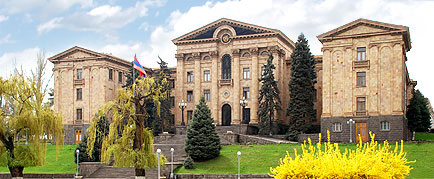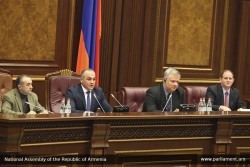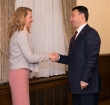On December 15, the RA NA Standing Committee on Defense and Security organized an international seminar on the Parliamentary Oversight of Armed Forces , where the RA NA deputies, Ambassadors accredited in the RA, representatives of the civil society, the international experts and the military took part. The seminar was organized within the programme NATO Week in Armenia .
The Chair of the RA NA Standing Committee on Defense and Security Koryun Nahapetyan made opening remarks and presented the themes under debate during the seminar.
Afterwards Koryun Nahapetyan presented the report on the Armed forces under parliamentary oversight: role of the parliament and powers of the Committee .
Mr Nahapetyan has noted that the parliamentary oversight of the armed forces is important for the parliament, executive power and the whole society. According to the reporter, the constitutional-legal affirmation of the parliamentary oversight and transition to the parliamentary system of government will have a positive impact not only on the efficiency of the government of the defense sphere, but also on the strengthening of the democratic institutes in Armenia. The effective parliamentary oversight will promote the decrease of the corruption risks in the armed forces, the rise of the protection of human rights and the strengthening of building integrity.
In Koryun Nahapetyan’s word, it is necessary to separate the democratic control towards the armed forces from the civil control: in our reality these two notions sometimes are presented under the same light. The civil control supposes that the state management of the defense sphere and the management armed forces are carried out by the civil power. The goal of the civil control is to provide the political neutrality of the armed forces and the subordination to the civil power.
In the reporter’s opinion, regarding the democratic control, it is a wider opportunity and presumes control implemented towards the armed forces by the state power through democracy. The democratic controls are: the control being implemented by the parliament, judicial power, the Defender of Human Rights, civil society, and mass media.
Mr Nahapetyan has documented that there are necessary legal bases in Armenia for the implementation of the civil and democratic, including the parliamentary control. By the Constitution it is distinctly enshrined that the armed forces are under civil control, and the National Assembly implements control towards the executive power.
Koryun Nahapetyan noted that in 2018 when a complete transition would be carried out to the parliamentary system of government, the entire tool set of the parliamentary oversight will be implemented, including the Investigative Committees. Only the RA NA Standing Committee on Defense and Security can implement authorities of the Investigative Committee in the spheres of defense and security.
In his report the Deputy Director of the Geneva Centre for the Democratic Control of Armed Forces (DCAF) Philipp Fluri touched upon the Committee powers in Parliamentary Democracies in the states by the parliamentary government. Philipp Fluri has noted that the oversight usually has different revelations: one of them is the civil control which also supposes parliamentary oversight. Rights are given to the parliament by the Constitution and the laws in order to implement control however by saying control we understand not a government, but a form of other cooperation.
In Mr Fluri’s word, in the issue of the control the thing relates not only to the transparency, accountability and building integrity, but also the establishment of trust in the society. Philipp Fluri has noted that the laws are necessary, but not sufficient precondition for implementing control. He emphasized the implementation of the programmes and events aimed at strengthening of the Committee Staff and stated that the Staff of the parliamentary Committee and the civil society should closely cooperate in the implementation of the control. In Philipp Fluri’s opinion, it is necessary to have ability, ambition and authority.
At the end of his report the Deputy Director of the Geneva Centre for the Democratic Control of Armed Forces expressed readiness to support the development of the parliamentary oversight mechanisms.
In his report the Armenian Atlantic Association (AAA) Executive Director Tevan Poghosyan touched upon the items of the strengthening of army-society mutual ties: democratic governance in the security sector. Mr Poghosyan emphasized the processes being implemented in Armenia in the direction of transparency and accountability in the security sector. In Tevan Poghosyan’s opinion, the state officials should be accountable to the society, explain and substantiate their actions and be the ones demanding. In Mr Poghosyan;s word, we should be accountable for the actions, as well as for not acting and for the use of the resources: the citizens have the right of being informed. Tevan Poghosyan has noted that by the RA new Constitution the parliament has all the tools of implementing oversight towards the executive power.
David Howarth, Senior Civil Servant at the Ministry of Defense of the United Kingdom of Great Britain and Northern Ireland, in his report highlighted the legal and constitutional principles of the Parliamentary oversight of the armed forces. Mr Howarth presented the situation over the issue under debate in the United Kingdom. In his word the UK has no Constitution as it is, and the Parliament and the government are at the same basis. David Howarth presented the experience of the British cooperation between the parliament and the government. According to the speaker, in his country the parliament can observe how the government uses the resources: saying oversight they mean the control of the legal field. In David Howarth’s word, in the UK the parliament has a great role in the governance of the armed forces, and the government gives substantial explanations to the parliament on its actions.
David Howarth has stated that Armenia is at the beginning of the long road: there are many things to do for elaborating the mechanisms of the parliamentary oversight and using them.
In the second session of the seminar the tools and mechanisms of parliamentary oversight of armed forces were presented: addressing questions in written form and orally to the members of the government, the interpellations in written form of the factions, the parliamentary hearings, the debates, the deputies’ announcements, demanding information, inviting the authorized officials to the parliament in clarifying the parliamentary oversight issues, the Investigation Committee and the subdivisions deployed abroad.
Rustam Makhmudyan, Deputy Chair of the Standing Committee on State and Legal Affairs and Protection of Human Rights of the National Assembly of the Republic of Armenia, has touched upon the role and the functions of the RA National Assembly which differ in terms of the parliamentary oversight from the National Assembly of the previous convocation.
The RA NA deputy in his word has particularly noted that Armenia can have fast developments in terms of defensive role, if Azerbaijan does not impede with provoking and destabilising actions. “The parliamentary oversight is called on to raise the rating of the security bodies, as well as providing open and transparent public governance,” Rustam Makhmudyan underlined.
John Gearson, Professor of National Security Studies, Department of War Studies, King's College London noted that the oversight mechanisms should reflect the military, political and social culture of the given country. According to him, it is senseless to copy the experience of the foreign country. Great Britain has ways of implementing the security mechanisms, particularly, the questions addressed to the executive body by the parliamentarians.
Talking about the tools and mechanisms of the German parliamentary oversight, Michael Teichmann, Senior Civil Servant at the Federal Ministry of Defense of the Federal Republic of Germany has noted that they are comprehensively used. The main institute of the parliamentary oversight, the next important body is the committee of the parliamentary armed forces which acts as Human Rights Defender on the international platforms. Mr Teichmann especially emphasized the fact that the Minister of Defense and the Committee Chair of the Armed Forces in the parliament are from different parties.
In the third session of the international seminar the role of the parliament in building integrity, corruption risk reduction in armed forces, defense budget planning were debated. The parliamentary oversight of efficiency of defense expenditures and procurement was highlighted.
The RA NA deputy Edmon Marukyan touched upon the parliamentary system, the activities of the Standing Committees which, according to the RA NA Rules of Procedure, have oversight functions, but there are no sufficient mechanisms for using them.
NATO Programme Officer for the Building Integrity Initiative Bénédicte Borel, , Chief of the Human Rights and Integrity Building Centre, Ministry of Defense of the Republic of Armenia Aleksander Avetisyan, Head of Internal Audit of the NATO Communication and Information Agency Mario Quarta and the President of the “National Centre of Public Policy Research” NGO procurement expert Artak Manukyan delivered speeches on the theme.
Summing up the results of the seminar, the RA NA Standing Committee on Defense and Security Koryun Nahapetyan thanked all the speakers for their speeches and noted taht every speech was important and useful.




 15.12.2017
15.12.2017 15.12.2017
15.12.2017 15.12.2017
15.12.2017 15.12.2017
15.12.2017 15.12.2017
15.12.2017
